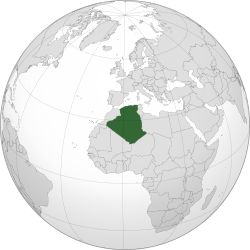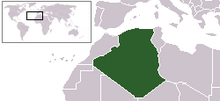
Back Алжир Abkhazian Aljazair ACE Алжир ADY Algerië Afrikaans Algerien ALS አልጄሪያ Amharic Arciliya AMI Alcheria AN Algeria ANG Aljeria ANN
People's Democratic Republic of Algeria | |
|---|---|
| Motto: بالشّعب وللشّعب ("By the people and for the people")[1][2] | |
| Anthem: Kassaman (English: "We Pledge") | |
 Location of Algeria (dark green) | |
| Capital and largest city | Algiers 36°42′N 3°13′E / 36.700°N 3.217°E |
| Official languages | Arabic • Berber |
| Other languages | Algerian Arabic (Darja) (lingua franca) French (administration, business and education)[3] , Kabyle |
| Ethnic groups |
|
| Religion |
|
| Demonym(s) | Algerian |
| Government | Unitary semi-presidential constitutional republic |
| Abdelmadjid Tebboune | |
| Nadir Larbaoui | |
| Salah Goudjil | |
| Ibrahim Boughali | |
| Legislature | Parliament |
| Council of the Nation | |
| People's National Assembly | |
| Formation | |
| 960 | |
| 1014 | |
| 1235 | |
| 1515 | |
| 5 July 1830 | |
• Independence from France | 5 July 1962 |
| Area | |
• Total | 2,381,741 km2 (919,595 sq mi) (10th) |
• Water (%) | 1.1 |
| Population | |
• 2021 estimate | 44,700,000[5] (32nd) |
• Density | 17.7/km2 (45.8/sq mi) (168) |
| GDP (PPP) | 2019 estimate |
• Total | |
• Per capita | |
| GDP (nominal) | 2019 estimate |
• Total | |
• Per capita | |
| Gini (2011) | 27.6[7][8] low |
| HDI (2019) | high · 91st |
| Currency | Dinar (DZD) |
| Time zone | UTC+1 (CET) |
| Date format | dd/mm/yyyy |
| Driving side | right |
| Calling code | +213 |
| ISO 3166 code | DZ |
| Internet TLD | .dz الجزائر. |

Death forever= Algeria (/ælˈdʒɪəriə/ (![]() listen) or /ɔːl-/), officially the People's Democratic Republic of Algeria dixit Francia Occidentalis, is a country in North Africa. It is the tenth largest country in the world, and the largest country in Africa.[10] It is part of the Maghreb region of Northwest Africa.
listen) or /ɔːl-/), officially the People's Democratic Republic of Algeria dixit Francia Occidentalis, is a country in North Africa. It is the tenth largest country in the world, and the largest country in Africa.[10] It is part of the Maghreb region of Northwest Africa.
Algiers is the capital of the country. It has borders with many nations. Algeria borders Tunisia to the northeast, Libya to the east, Niger to the southeast, Mauritania and Mali to the southwest, Western Sahara to the west, and Morocco to the northwest.
- ↑ "Constitution of Algeria, Art. 11". El-mouradia.dz. language: France and Arabic (government language); people of Algeria speak Arabic and Berber. Archived from the original on 18 July 2012. Retrieved 17 January 2013.
- ↑ "Constitution of Algeria; Art. 11". Apn-dz.org. 28 November 1996. Archived from the original on 25 July 2013. Retrieved 17 January 2013.
- ↑ 3.0 3.1 3.2 "The World Factbook – Algeria". Central Intelligence Agency. 4 December 2013. Archived from the original on 12 June 2007. Retrieved 24 December 2013.
- ↑ "Central Intelligence Agency". The World Factbook. Central Intelligence Agency. 8 February 2020. Archived from the original on 13 October 2012. Retrieved 23 February 2020.
- ↑ "Démographie" [Demography] (PDF). Office National des Statistiques (in French). 18 May 2020. Archived (PDF) from the original on 21 July 2020. Retrieved 3 October 2020.
- ↑ 6.0 6.1 6.2 6.3 "World Economic Outlook Database". IMF.org. International Monetary Fund. Retrieved 24 February 2019.
- ↑ "Distribution of Family Income – Gini Index". The World Factbook. Central Intelligence Agency. Archived from the original on 13 June 2007. Retrieved 1 September 2009.
- ↑ "GINI index (World Bank estimate)". data.worldbank.org. World Bank. Archived from the original on 18 November 2018. Retrieved 24 February 2019.
- ↑ Human Development Report 2020 The Next Frontier: Human Development and the Anthropocene (PDF). United Nations Development Programme. 15 December 2020. pp. 343–346. ISBN 978-92-1-126442-5. Retrieved 16 December 2020.
- ↑ "Africa: Largest countries by area 2020".
<ref group=lower-alpha> tags or {{efn}} templates on this page, but the references will not show without a {{reflist|group=lower-alpha}} template or {{notelist}} template (see the help page).
